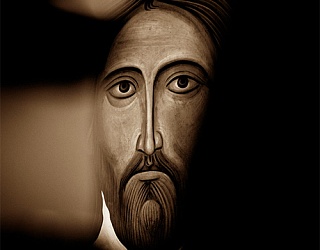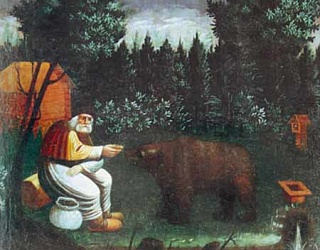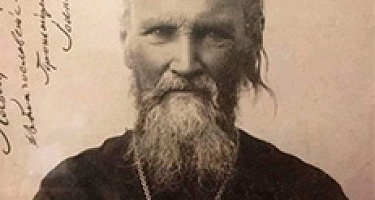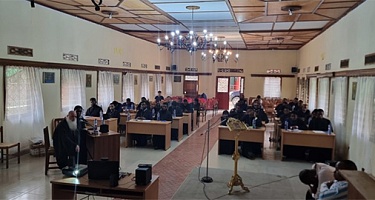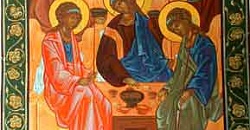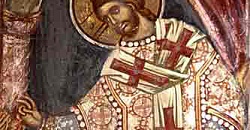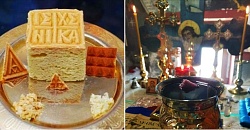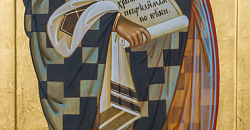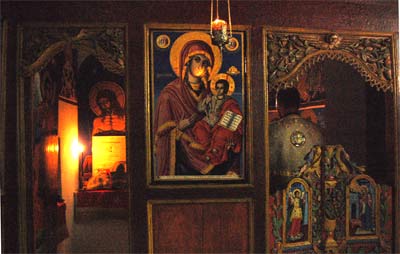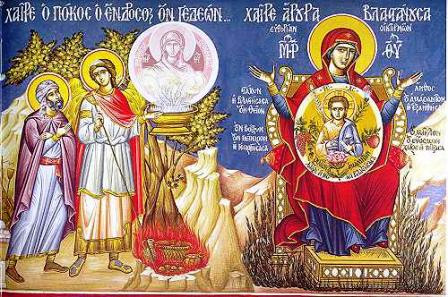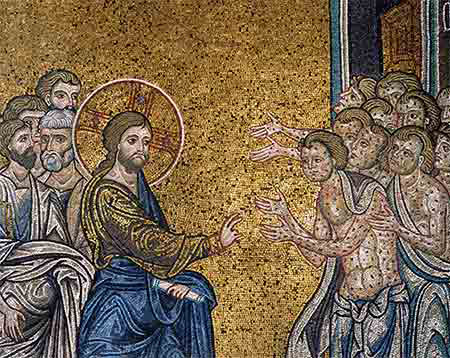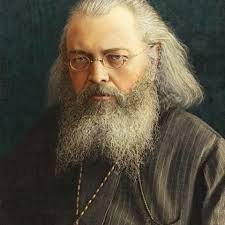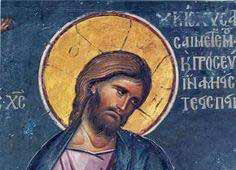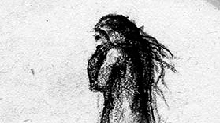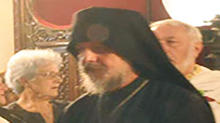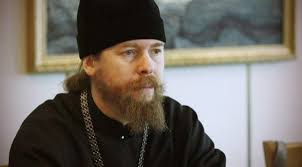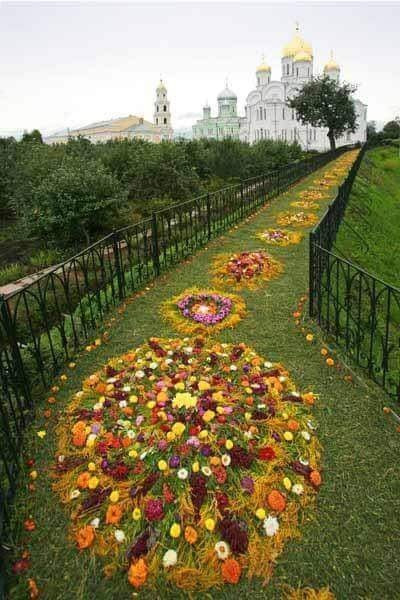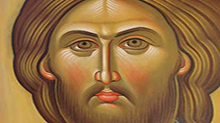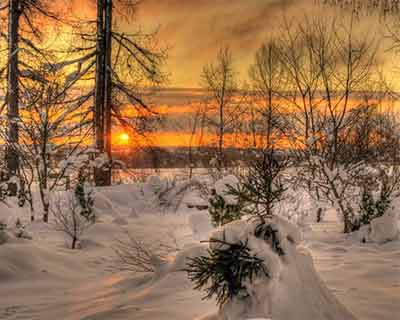 Кратко житие за старец Софрониј од Есекс
Кратко житие за старец Софрониј од Есекс
Ни треба помош, после Бога ни треба духовен раководител – пишува Свети Доротеј од Газа во шестиот век. Веќе од почетокот на христијанската историја, многумина, според потеклото од секаков општествен слој, копнеејќи да го исполнат својот всаден повик, да го најдат патот на срцето и да ги искачат светите скалила што водат кон Бога, бараа духовни раководители способни да ги поведат по тесниот пат на спасението. Векови на ред, барајќи совет, утешително слово или вдахновение, многумина мажи и жени ја повторуваат оваа изрека, толку мила на Отците од пустината: Авво, кажи ми слово. Духовното очинство, дар на Светиот Дух, е живо срце на Православната Црква. Тоа е златен синџир на преданието, кое нè потсетува дека Христијанството не е книшка религија, туку, откровение на тајната на личноста (tou proswpou).
Старец Софрониј е светол сведок на ова откровение. Тој разликува два вида слова во своето учење: слово што соопштува и слово што причестува. Слово што сведочи и слово што вдахновува. Душевното слово (во дадениот случај со религиозна тема), и духовното слово, носител на Светиот Дух, на продолжената Педесетница. Ова е соодветно со преданието на Црквата, на Телото Христово. Како спроводник на божествената благодат, духовното слово е ретко. Имајќи за темел една силна догматска свест, тоа не е теоретско. Богословско, со длабоко значение на зборот, ова слово не се раѓа од книгите или од теоретското знаење, туку, од подвигот и од молитвата, од истоштението*, и од опит на Бога. Значи, треба да се испразниме од страстите и од сопствената волја, за да можеме да се исполниме со Светиот Дух, изворот на секоја вистина. Треба да го повикуваме Името, кое ги содржи сите имиња, Името на Исус Христос, да го симнеме умот во скришното место на срцето, за да навлеземе во бескрајно молчание, каде што Бог ни говори, и од каде што можеме да проговориме вистински во срцето на ближниот. Потребно е да ја раскинеме темнината на нашиот личен, внатрешен пекол, за да се преродиме од несоздадената Светлина што зрачи од воплотеното Слово.
Духовните отци, живите образи (eikoneV) Христови, носители на Светиот Дух, Кој говори преку нив, го означуваат ова со својот пример. Само оној, што умре за себеси и воскресна во Христа, може да роди слово што оживува, што ослободува во Духот. Само оној, што се нурна во молчанието – јазикот на идниот век согласно Свети Исаак Сирин, може да роди слово што е одѕив на првоначалното Слово, на Словото – Создател. На крајот, само оној, што ја најде вистинската Светлина, што стана чист, прозрачен во своите енергии, може да го посведочи присуството Божјо со своето присуство и со своето слово.
Овој пат на особено истоштение го следеше Старец Софрониј во шеесет и осумте години на својот монашки живот. Роден е во Москва во 1896-то лето Господово. Уште од најраната младост го интересираа најжешките метафизички прашања. Избувнувањето на Првата Светска Војна (1914. – 1918.г.) и братоубиствената војна во Русија, му го откриваат трагичниот карактер на човековото постоење.
Вдахновен од сеќавањето на смртта, се здобива со опит за бездната на непостоењето, додека, истовремено го чувствува и суштествувањето на бескрајното Битие. Немајќи благонаклони услови, (заради востанието), да ја практикува својата голема страст, сликарството, заминува за Европа и пристигнува во Париз во 1922-ра година, каде што за кратко време прави изложба на свои дела во Салон д’Аутомне и во Салон дес Туилериес. Таму се запознава со својот пат кон Дамаск. Се отвора кон тајната на Бога како Апсолутно жив и личносен, Кој се јави во плот во личноста на Богочовекот Исус Христос. Со посетата на благодатта ја освестува големината на своите минати и сегашни гревови, го открива она што го разделува од Бога, но, и совршенството на кое е повикан човекот. Во очајание и во многу солзи го живее своето второ крштение: покајанието. Нурнувајќи се во темнината на пеколот, Бог му се јавува во Својата Светлина. Започнува нов живот, полн со молитва и љубов спрема Христа. Го губи светот и светот го губи него. Наизменичните посети на Божествената Светлина и сеќавањето на смртта го спречуваат неговото сликарско творештво. По неколку месечна внатрешна борба, се одрекува од уметноста и решава да му го посвети животот на Бога. Се запишува на Богословскиот Институт “Свети Сергеј” во Париз, кој туку што бил основан. Сепак, богословските студии не го исполнуваат. Во 1925 година Старец Софрониј пристигнува на Света Гора и станува монах во рускиот манастир Свети Пантелејмон. Многу брзо го восприема дарот на непрестаната молитва. Но, исто така, ја запознава и смртната и живототворна болка на губењето на благодатта. Смртна – зашто му ја открива неговата ништожност и длабочината на неговиот грев. Живототворна – зашто е извор на покајание, што го скрушува срцето, ја привлекува Божјата Милост и уште поголемата благодат. Духовниот живот на отец Софрониј распространет помеѓу Гетсиманската градина и гората Тавор е пат на солзи; внатрешно патешествие помеѓу радоста и безнадежноста, помеѓу богооставеноста и посетите на Светиот Дух.
 Сепак, за Старец Софрониј главно, Света Гора е најголемиот и решителен настан на неговото постоење, вистински дар на промислата Божја; особено, неговата средба со Блажениот Старец Силуан. Овој огнен подвижник, руски селанец во кого Тхомас Мертон го виде најавтентичниот монах на дваесетиот век ја прими не само благодатта да го види Христа, туку и едно слово на спасение за нашата епоха: Држи го својот ум во пеколот и не очајувај. Во овој смирен човек, кој се молеше и плачеше за целиот свет како за самиот себе си, кој ја живееше на највисок степен љубовта спрема непријателот, Старец Софрониј го виде воплотувањето на ипостасното совршенство: човекот, според образ Божји.
Сепак, за Старец Софрониј главно, Света Гора е најголемиот и решителен настан на неговото постоење, вистински дар на промислата Божја; особено, неговата средба со Блажениот Старец Силуан. Овој огнен подвижник, руски селанец во кого Тхомас Мертон го виде најавтентичниот монах на дваесетиот век ја прими не само благодатта да го види Христа, туку и едно слово на спасение за нашата епоха: Држи го својот ум во пеколот и не очајувај. Во овој смирен човек, кој се молеше и плачеше за целиот свет како за самиот себе си, кој ја живееше на највисок степен љубовта спрема непријателот, Старец Софрониј го виде воплотувањето на ипостасното совршенство: човекот, според образ Божји.
По смртта на својот Старец во 1938-ма година, заминува во пустина, за да ја провери верноста на својата љубов спрема Бога. Станува пустиножител и духовник на многу манастири и ја вкусува бескрајната слобода на чистата молитва, слободата оданде смртта. Сепак, и во длабочината на својата пештера го слуша пискотот на светот. Бог му дава благодат да се моли за целиот Адам, да учествува со своето срце во страданијата и стравотиите на завојуваното човештво.
Во 1947 година по Божја Промисла ја напушти Света Гора и се враќа во Франција. Следната година го издава она што Старец Силуан го напишал, заедно со воведот во неговото учење, кое станува класично дело на православниот аскетски живот: Старец Силуан.
Привлечени од неговото духовно зрачење, неколкумина припадници на различни националности се собираат околу него во предградието Sainte-Genevieve-des-Bois близу Париз. Тешко болен, изложен на неблагонаклони услови, Старец Софрониј не може да се врати на Света Гора. Во 1959 година следен од своите ученици заминува во Англија, каде што го основа Манастирот Свети Јован Крстител. Беше општежител и пустиножител. Станува сведок на Светлината, во срцето на светот. Го пронајде својот прв дар. Иконописува и пишува книги, меѓу кои и неговата духовна автобиографија во книгите: “Да го видиме Бога Каков што Он Е” и “За молитвата”.
Станувајќи вистински носител на Православието, истото го пренесува на Запад, одговарајќи му така на неговите проблеми. Во Манастирот, Златоустовата Литургија е преведена на англиски, а, се совршува и на други јазици. Наместо секојдневните богослужби ја востановува Исусовата молитва, тихувана на различни јазици. Во 1988 година длабокото претчувство на отец Софрониј се потврдува, така што делото на неговиот живот е наградено: Старец Силуан е признаен за Свет од страна на Вселенската Патријаршија во Константинопол.
Денес, Светата Обител на Манастирот Свети Јован Крстител е ввкупно дваесет и пет монаси и монахињи од дванасет различни националности. Како центар за прием на стотици поклоници од целиот свет, манастирот не претставува само едно од поглавните светилки од кои зрачи Православието на Запад, туку е и една од посилните потврди на неговото сесветско значение.
Приближувајќи се кон крајот на својот земен живот, Старец Софрониј во последните неколку години ја чувствува потребата да им го предаде на своите духовни чеда плодот од опитот на неговиот, во Христа живот. Секоја недела со своето слово ги храни членовите на својот Собор и го вдахновува нивниот секојдневен живот советувајќи ги и поучувајќи ги. Необјавените поглавја што досега се собрани се отсечоци од околу четириесет негови беседи. Делумните записи, сепак не го оддаваат совршеното богатство на неговото учење. Треба да се присуствува на беседите на Старецот Софрониј, за да се почувствува молитвеното прегрнување на своите браќа со неговиот поглед полн со љубов, за да се разбере силата и вдахновението Божјо што го оживуваа неговото слово.
Избраните отсечоци што ги објавуваме не се ниту метафизички мисли, ниту животни правила, ниту морални начела. Нахранет со словото Божјо и со размислите на аскетските отци, словото на Старец Софрониј е евангелско и красотољубиво (filokalikoV) во вистинското значение на зборот. Рожба е на срцето. Не ì се обраќа на рационалната мисла, туку на чувствителното крајче на душата што е скриеното срце на човекот. Како плод на Светиот Дух, тоа е семе на живот во Духот, вруток предизвикан од повикот на Името. Тоа е молитва, која повикува на молитва. Слово вдахновено од Бога, што води кон Бога. Иако силно, тоа е и нежно. Полно е со љубов и нè закрепнува. Иако е апсолутно, тоа е и искупително. Иако многу бара, тоа нè одмора. Иако со икуменско значение, цели кон она што за секој човек е превасходно. Остро како нож, повикува на покајание, да го измени нашето камено срце, да ни го преобрази умот, за повторно да се пронајдеме самите себеси, во образот Божји кој е врежан во длабочините на нашата душа, но, е покриен со сите маски со кои нашето јас најневкусно е украсено.
 Старец Софрониј не се стреми ниту да убедува, ниту да плени. Неговото слово или ја допира душата, или не ја допира. Една семка не може да се вкорени и да даде плод освен посеана на земја подготвена да ја прими. Сè зависи од нашата способност да слушаме, од нашиот копнеж да се преобразиме и од нашата волја да кажеме “да”. Дали сме подготвени да се отвориме и да се принесеме? Слободни сме!
Старец Софрониј не се стреми ниту да убедува, ниту да плени. Неговото слово или ја допира душата, или не ја допира. Една семка не може да се вкорени и да даде плод освен посеана на земја подготвена да ја прими. Сè зависи од нашата способност да слушаме, од нашиот копнеж да се преобразиме и од нашата волја да кажеме “да”. Дали сме подготвени да се отвориме и да се принесеме? Слободни сме!
На секое слово може да му се противстави некое друго слово, но на животното сведоштво кој ќе се противстави? – велеше Свети Григориј Палама.
Извор: нманастир на св. Прохор Пчински, Донибрук, Австралија
Elder Sophrony- short biography
Archimandrite Sophrony was born in 1986, to Orthodox parents in Tsarist Russia. From childhood he showed a rare capacity for prayer and as a young boy would ponder questions heavy with centuries of theological debate. A sense of exile in this world spoke of an infinite always embracing our finitude. Prayer entails the idea of eternity with God. In prayer the reality of the living God is yoked with the concrete reality of earthly life. If we know what a man reverences, we know the most important thing about him- what it is that determines his character and behavior. The author of His Life is Mine was early possessed by an urgent longing to penetrate to the heart of divine eternity through contemplation of the visible world. This craving, like a flame in the heart, irradiated his student days at the State School of Fine Arts in Moscow. This was the period when a parallel speculative interest in Buddhism and the whole arena of Indian culture changed the clef of his inner life. Eastern mysticism now seemed to him more profound than Christianity, the concept of a supra-personal Absolute more convincing than that of a Personal God. The Eastern mystic’s notion of Being imparted overwhelming majesty to the transcendental. With the advent of the First World War and the subsequent Revolution in Russia he began to think of existence itself as the causa causens of all suffering and so strove, through meditation, to divest himself of all visual and mental images.
His studio was at the top of a tall house in a quiet part of Moscow. There he would labour for hours on end, straining every nerve to depict his subject dispassionately, to convey its temporal significance, yet at the same time to use it as a spring-board for exploring the infinite. He was tortured by conflicting arguments: if life was generated by the eternal, why did his body need to breathe, eat, sleep, and so on? Why did it react to every variation in the physical atmosphere? In an effort to break out of the narrow framework of existence he took up yoga and applied himself to meditation. But he never lost his keen awareness of the beauty of nature.
Daily life now flowed on the periphery, as it were, of external events. The one thing needful was to discover the purport of our appearance on this planet; to revert to the moment before creation and be merged with our original source. He continued oblivious to social and political affairs- utterly preoccupied by the thought that if man dies without the possibility of returning to the sphere of Absolute Being, then life held no meaning. Occasionally, meditation would bring respite with an illusion of some unending quietude which had been his fountain-head.
The turmoil of the post- Revolutionary period made it increasingly difficult for artists to work in Russia, and in 1921 the author started to search for ways and means of emigrating to Europe- to France, in particular, as the centre of the world for painters. En route he managed to travel through Italy, looking long at the great masterpieces of the Renaissance. After a brief stay in Berlin he finally reached Paris and flung head, heart and soul into painting. His career made a satisfactory start: the Salon d’ Automne accepted his first canvas and the Salon des Tuileries, the elite of the Salon d’ Automne, invited him to exhibit with them. But on another level all was not going as he had expected. Art began to lose its significance as a means to liberation and immortality for the spirit. Even lasting fame would be but a ludicrous caricature of genuine immortality. The finest artifact is worthless when considered against the background of infinity.
Little by little it dawned on him that pure intellection, an activity of the brain only, could not advance one far in the search for reality. Then suddenly he remembered Christ’s injunction to love God ‘with all thy heart, and with all thy mind’. This unexpected insight was as portentous as that earlier moment when the Eastern vision of a supra-personal Being had beguiled him into dismissing the Gospel message as a call to the emotions. Only that earlier moment had struck dark as a thunderclap, while now revelation illuminated like lightning. Intellection without love was not enough. Actual knowledge could only come through community of being, which meant love. And so Christ conquered: His teaching appealed to his mind with different undertones, acquired other dimensions. Prayer to the Personal God was restored to his heart- directed, first and foremost, to Christ.

He must decide on a new way of living. He enrolled in the then recently opened Paris Orthodox Theological Institute, in the hope of being taught how to pray, and the right attitude towards God; how to overcome one’s passions and attain divine eternity. But formal theology produced no key to the kingdom of heaven. He left Paris and made his way to Mount Athos where men seek union with God through prayer. Setting foot on the Holy Mountain, he kissed the ground and besought God to accept and further him in this new life. Next, he looked for a mentor who would help extricate him from a series of apparently insoluble problems. He threw himself into prayer as fervently as he previously had in France. It was crystal-clear that if he really wanted to know God and be with Him entirely, he must dedicate himself to just that- and still more entirely than he had to painting in the old days. Prayer became both garment and breath to him, unceasing even when he slept. Despair combined with a feeling of resurrection in his soul: despair over the peoples of earth who had forsaken God and were expiring in their ignorance. At times while praying for them he would be driven to wrestle with God as their Creator. This oscillation between the two extremes of hell on the one side and Divine Light on the other made it urgent that someone should spell out the point of what was happening to him. But another four years were to pass before the first encounter with the Staretz Silouan which he quickly recognised as the most precious gift Providence ever made to him. He would not have dared dream of a such a miracle, though he had long hungered and thirsted after a counselor who would hold out a strong hand and explain the laws of spiritual life. For eight years or so he sat at the feet of his Gamaliel, until the Staretz’ death when he begged for the blessing of the Monastery Superior and Council to depart into the ‘desert’. Soon after, the Second World War broke out, rumours of which (no actual news filtered through to the wilderness) intensified his prayer for all humanity. He would spend the night hours prone on the earth floor of his cave, imploring God to intervene in the crazy blood-path. He prayed for those who were being killed, for those who were killing, for all in torment. And he prayed that God would not allow the more evil side to win.

During the war years the desert felt remarkably more silent and withdrawn than of wont, since the German occupation of Greece bared all traffic on the sea around the Athonite peninsula. But the author’s total seclusion ended when he was urged to become confessor and spiritual father to the brethren of the Monastery of St Paul. Staretz Silouan had predicted that he would one day be a confessor and had extorted him not to shrink from this crucial form of service to people- service which necessitates giving one-self to the supplicant, accepting him into one’s own life, sharing with him one’s deepest feelings. Before long he was called to other monasteries, and monks from the small hermitages of Athos, anchorites and solitaries turned to him. It was a difficult and heavily responsible mission but he reasoned to himself that it was his duty to try and repay the succour which he had received from his fathers in God, who had so lovingly shared with him the knowledge granted to them from on High. He could not keep their teaching to himself. He must give freely of what he had freely received. But to be a spiritual counselor is no easy task: it involves transferring to others attention hitherto destined for oneself, looking with imaginative sympathy into other hearts and minds, contending with my neighbour’s problems instead of my own.
After four years spent in a remote spot surrounded by mountain crags and rocks, with little water and almost no vegetation, the author assented to a suggestion from the Monastery of St Paul to move into a grotto one their land. This new cave had many advantages for an anchorite-priest. There were many hermits in the desert and they tended to settle close to one another, though hidden from sight by bounders and cliffs. Here, besides being completely isolated, there was a tiny chapel, some ten feet by seven, hewn out of the rock-face. But winter was a trying time. The first downpour would flood the previously dry cave and then every day for perhaps six months he was obliged to scoop up and throw outside some hundred buckets of water soaking his cough. Only the little chapel stayed dry. There he could pray, and keep his books. Everywhere else was wet. Impossible to light a fire and warm up something to eat. In the end, after the third winter, failing health compelled him to abandon the grotto which had afforded the rare privilege of living detached from the world.
It was now that the idea came to him of writing a book about Staretz Silouan, to record the precepts which had so helped him to find his bearings in the wide expanses of the spirit by instructing him in the ways of spiritual combat. To carry out this project he would have to go back to the West- to France, where he had felt more at home than in any other country in Europe. His first intention was to stay for a year but then he found that he would need more time. Working in difficult conditions, he fell dangerously ill and a serious operation left him an invalid, causing him to lay aside all thought of returning to a desert cave on Mount Athos.
The preliminary edition of his book concerning Staretz Silouan he roneo-typed himself. A printed edition followed in 1952. Thereafter the translations began: first into English (The Undistorted Image), then German, Greek, French, Serbian, with excerpts in still other languages. The reaction of the ascetics of the Holy Mountain was of extreme importance to the author. They confirmed the book as a true reflection of the ancient traditions of Eastern monasticism, and recognised the Staretz as spiritual heir to the great Fathers of Egypt, Palestine, Sinai and other historic schools of asceticism dating back to the beginning of the Christian era.
Archimandrite Sophrony felt convinced that Christ’s injunction, ‘keep thy mind in hell, and despair not’, was directed through Staretz Silouan to our century especially, drowned as it is in despair. (Are not the ‘perilous times’ come, ‘when men shall be lovers of their own selves…unthankful, unholy…trucebreakers, false accusers…despisers of those that are good…lovers of pleasures more than lovers of God; having a form of godliness but denying the power thereof…ever learning, and never able to come to knowledge of the truth?). He believed, too, that as Staretz had prayed for decades with such extraordinary love for the human race, entreating God to grant all mankind to know Him in the Holy Spirit, so men would love the Staretz in return. The Russian poet Pushkin claimed that no monument would be necessary to keep alive remembrance of him- his fellow countrymen would no long cherish his memory for he had sung of freedom in a cruel age, of mercy to the fallen. Had not the Staretz in his humility rendered a still nobler service to humanity? He taught us how to drive away despair, explaining what lay at the back of this terrible spiritual state. He revealed to us the Living God and His Love for the sons of Adam. He taught us how to interpret the Gospel in its eternal aspects. And for many he made the word of Christ real, part of everyday life. Above all, he restored to our souls a firm hope of blessed eternity in the Divine Light.

Throughout the book “His Life is Mine”, Archimandrite Sophrony reflects the teaching of his spiritual father. Not all of it will be intelligible at first perusal- in fact, it is not easy reading on any reckoning. Form must be sacrificed to content when the translator is caught in the uncomfortable limbo between languages; and in a work of this kind the author is so often speaking across a semantic chasm. Few of us have any inkling of the life described in these pages. But close study will make us familiar with the Athonite ascetic’s manner of living, and then we can with profit try to apply some of the lessons learned to our own case. Grace, which is God’s gift of holiness, depends upon man’s attempt at holiness.
In 1959, accompanied by his disciples, he left for England, where he founded the Monastery of Saint John the Baptist. Having been a coenobitic monk and a hermit, he was now ‘a witness to the light’ (cf. John 1:7,8) at the heart of the world. In 1993, 11th July, Elder Sophrony humbly and peacefully rendered his soul to God.
Today, the Monastery of Saint John the Baptist is a place where hundreds of pilgrims from all over the world are welcomed; it is not only one of the main centres from which Orthodoxy is radiated in the West, but also one of the strongest affirmations of the universality of Orthodoxy





